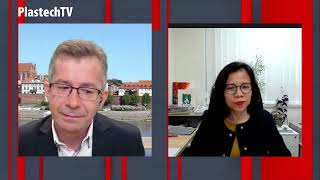The result of a survey on polyethylene bags was first published in Vjesnik on 4 April 2007. At that time, 70 percent of readers supported precisely these bags. After the Italian ban on these bags (and by the way, they are not capable of solving the issue of waste in Naples) and direct support of the Croatian media to the Italian initiative on the basis of obsolete data, I was very much interested in the repeated question. The support dropped to 55 percent, but this support is on a relatively large sample. This can be explained only by the fact that the Vjesnik readership in these areas is most familiar with the advantages and drawbacks of plastics, including also the problem of polyethylene bags.
And what about the plastic dog owned by a renowned plastics expert. This dog likes to play with PET bottles and when he gets bored with this, he unscrews the polyethylene cap, bites it all over and eats it! This is the best proof that even when they are eaten, polyethylene particles do not cause the death of mammals, a typical stereotype. Based on a report by Canadian researchers, where they replaced nylon by polyethylene. Animals can choke on the ingested polyamide, popular nylon fishing nets.
Every day sees more and more bans or orders. Undoubtedly in favour of the powerful who are in the position to impose these, with underinformed media, because of their interests, namely, profits. Therefore, in the foreseeable future we may expect to have an information bubble which will filter through only the information permitted or there will be micro-chipping required, as pet chipping nowadays.
If the Croatian TV continues to broadcast contributions such as the one by Togonal on ban of polyethylene bags, I will require strict ban of public performances by anyone being an expert and professional in the respective field. All it takes is a statement of an Italian woman in the street, an expert on everything and anything, or of somebody who has forgotten that it was he who commissioned the first Croatian study on one group of waste. It was in 1997, and, of course, it referred to plastic waste.
Finally, a part of a somewhat expanded text from the article Aggressive promotion (Vjesnik, April 24, 2009) should be repeated. »Manipulation of plastic bags is easy for governments, traders and customers. Through various funds, the state charges a fee for management. If charging the bags, the traders realize additional revenue, not spending on the necessary packaging, and the customers therefore only pay more expensive food (food is weapon). At the same time, due to the influence of the media, customers feel as if they were environmentally aware, and contributing to the preservation of our planet. Time has come for a change in thinking; fortunately, plastic bags are not the planet’s penitence, their greatest evil is that they distract our attention from more urgent matters« (Guardian, April 8, 2009).
The author is a retired professor of the Faculty of Mechanical Engineering and Naval Architecture of the University of Zagreb.
The article was also published in Croatia newspaper Vjesnik, 2011-01-14

iwWjihUo *.133.110.36 |
sent: 2012-04-23 11:52:39 Hey, that's a clever way of thiinkng about it. |


